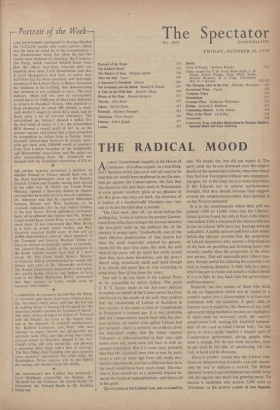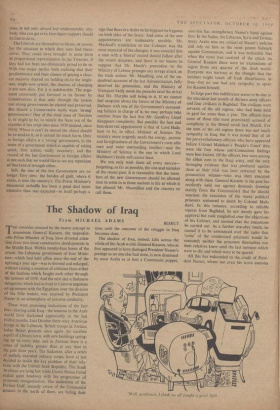THE RADICAL MOOD
ALARGE Government majority in the House of Commons—it is often argued—is a bad thing. Is it? Readers of the Spectator will not need to be told that we would have preferred to see the elec- tion go against the Conservatives; the fact that the electorate has sent them back to Westminster in even greater numbers gives us no pleasure at all. But given that they are back, the existence of a surplus of a hundred-odd Members may turn out to be less harmful than it sounds.
`The chief need, after all,' we wrote before the polling day, 'is less to rembve the present Govern- ment from office than to begin the process whereby the two-party hold on the political life of the country is prised open.' Undoubtedly one of the most effective preservatives of that system has been the small majorities enjoyed by govern- ments for the past nine years. But now, the wild men of the party will be much less easily tamed than they have been heretofore; and the party's liberal wing, wretchedly small and timid though it is, should feel more free to vote according to conscience than it has done for years.
Nor will it do any harm to the Labour Party to be compelled to admit, failure. The point J. E. S. Simon made in his Spectator election broadside on behalf of the Conservatives has been reinforced by the results of the poll; they confirm that the relationship of Labour to Socialism in this country is the same as that of Conservatism to Protection a century ago. It is very probable that the Conservatives would have won the elec- tion anyway, no matter what policy Labour had put forward—there is certainly no evidence from the individual results that the voters rejected Tribuners or, fellow-travellers in their own right (some went out, some were put back in with in- creased majorities). But it is more than probable that had Mr. Gaitskell been able to tear his party away a year or more ago from old, seedy doc- trinaire attachments, and put a different face on it, the result would have been much closer. The elec- tion at least should act as a powerful impulse to- wards the burial of nationalisation—and that is all to the good.
The increase in the Liberal vote, too, is a healthy sign. We hoped for, but did not expect it. The party need not be too downcast over the relative gloom of the second day's results, when they heard they had lost Torrington without any compensat- ing gain; for in the long run it is more important, if the Liberals are to recover parliamentary strength, that they should increase their support around the constituencies rather than increase it on the Western seaboard.
It is in the constituencies where their poll ran around 5,000 to 12,000 votes that the Liberals' future is to be found, for only in them is the liberal vote radical. Only a fraction of the electors who put in the six Liberal MPs have any leanings towards radicalism. A public opinion poll held a few weeks before the election revealed that the proportion of Liberal supporters who wanted a liberalisation of the laws on gambling and licensing hours was actually smaller than the proportion in the other two parties. This old nonconformist Liberal sup- port, though useful for inflating the minority vote (and in keeping deposits), is little help to a party which has got to create and sustain a radical mood if it is to fight its way back into the government- making category.
Naturally the first instinct of those who want, to see an Opposition which can be turned at a month's notice into a Government is to fuse new radicalism with old socialism. A queer class of Siamese twin it would be; the chances of any such agreement being reached at present are negligible. If there were an economic crisis, the country would move Left, making Mr. Gaitskell indepen- dent of the need to court Liberal help : for the party to revive really requires a longish spell of Conservative government, giving people who want a change, but do not want Socialism, time to get used to the idea of substituting Lib. for Lab. in local and by-elections.
There is another reason why the Liberal vote, however disappointing in results, can still reason- ably be said to indicate a revival. The British electoral system is gerrymandered (no milder term will do) against any small but growing party. To dismiss a candidate who secures 5,000 votes as 'frivolous,' as the present system of lost deposits
does, is not only absurd but undemocratic; any- body who can get even four-figure support should be free to do so.
The Liberals are themselves to blame, of course, for the situation in which they now find them- selves. They could have brought in some form of proportional representation in the Twenties, if they had not been too obstinately proud to do so. With two major parties both realising that their predominance and their chance of getting a clear- cut majority depend on holding on to the single- seat, single-vote system, the chances of changing it are now slim. Yet it is indefensible. The argu- ment commonly put forward in its favour by Conservatives is that only through the system can strong governments be elected and preserved. But should a Conservative really want 'strong' governments? One of the chief aims of Toryism is, or ought to be, to winkle the State out of the crannies it has crept into since 1939 (indeed, since 1914). Where it can't be moved the object should be to weaken it, so it cannot do much harm. Only in foreign affairs is a 'strong' government, in the sense of a government which is capable of taking quick, firm action, really necessary; and the record of the last Government in foreign affairs is not such that we would like to sec any repetition of that kind of strength either.
Still, the sins of the last Government are no longer Tory sins : the burden of guilt, where it exists, is now the country's. The Prime Minister's ministerial reshuffle has been a good deal more extensive than was expected--in itself perhaps a sign that there is a desire to let bygones be bygones on both sides of the fence. And some of the new appointments arc undeniably sensible. Mr. Macleod's translation to the Colonies was the most expected of the changes; it was essential that a man with a 'liberal' record should follow after the recent disasters, and there is no reason to suppose that Mr. Heath's promotion to the Ministry of Labour presages any savage attack on the trade unions. Mr. Maudling, one of the un- doubted successes of the last Administration, fully deserved his promotion, and the Ministry of Transport badly needs the panache (and the drive) that Mr. Marples will bring to it. If we cannot feel sanguine about the future of the Ministry of Defence with one of the Government's outstand- ing failures in charge of it, we may perhaps take comfort from the fact that Mr. Geoffrey Lloyd disappears completely. But possibly the best and best-deserved appointment is that of Lord Hails- ham to be, in effect, Minister of Science. No ministry more urgently needs the energy, passion and farsightedness of the Government's most able man and most outstanding intellect—and the Ministry of Science is the one in which Lord Hailsham's faults will matter least.
We can only wish them all every success— forgetting, as far as possible, the sins and mistakes of the recent past. It is reasonable that the mem- bers of the new Government should be allowed time to settle in in those stations in life to which it has pleased Mr. Macmillan and the country to call them.







































 Previous page
Previous page